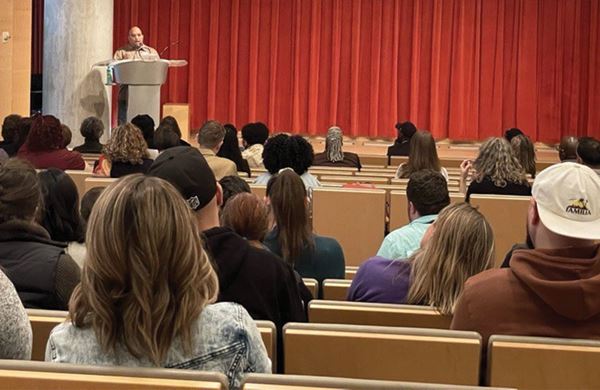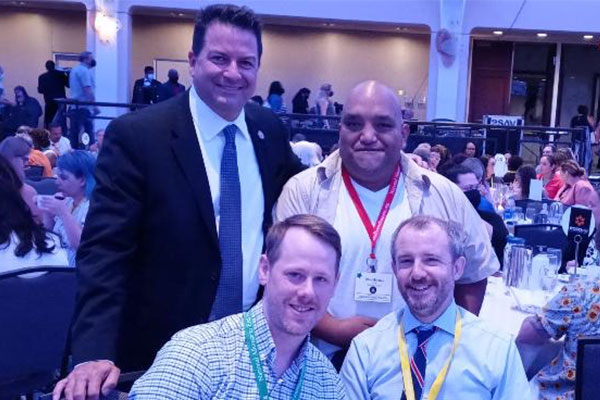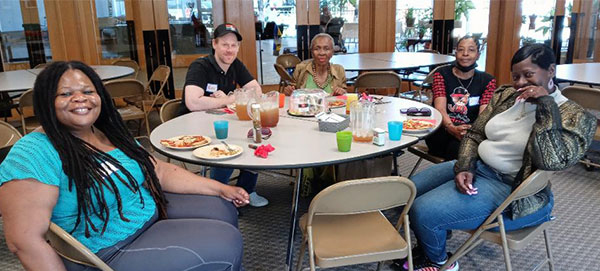Representation matters: How LEAG is influencing housing programs
The Lived Experience Advisory Group (LEAG) is key to making lasting change
Rico Morales is a lot of things. He’s a lifelong Minnesota resident. He’s an Indigenous person. He’s struggled with housing stability for most of his life. He is also one of the leading voices for change in housing support programs—not just for the county, but for the region and the country.
As co-chair of Hennepin County’s Lived Experience Advisory Group (LEAG), Morales advises Hennepin County staff, City of Minneapolis staff, and groups both state and nationwide to better integrate the lived experiences of the homeless population. It’s critical, he says, to making change that lasts.
“Centralizing a better user experience for everyone is key,” Morales said. “We’re involved in some of the big decisions and discussions with Hennepin County housing services. We have influence on even things that feel small–like the words we choose to talk about homeless people–but that start to break the system.”

Rico Morales speaking at the Annual Heading Home Hennepin Community Meeting in November 2023. Hosted by Hennepin County, the meeting gathers housing leaders across the region to discuss challenges and solutions.
Providing critical insight
Launched in 2021, the creation of LEAG was centered on the belief that those closest to the issue are closest to the solution–meaning those that have gone through, or are currently going through, housing instability will have the best insights on how to create better responses, programs, and systems. LEAG members are experts on the experience of homelessness.
Meeting monthly, LEAG members have space to support one another and Hennepin County staff, learn about topics of interest, and organize around common ideas. Members also work with government officials and grant administrators to influence how money is spent and how decisions are made, and to advocate for priority issues. Members are compensated for their participation and have the opportunity to consult on additional projects as well.
Incorporating the perspective of people with lived experience is not new to the county’s Housing Stability Area. Now, however, there is infrastructure that can support and sustain engagement. There’s an established budget, policy and procedures, best practices, and dedicated staff support.

Rico and housing staff at National Alliance to End Homelessness Conference in Washington D.C., Summer 2022.
Back row: Jeff Olivet, Executive Director of the US Interagency Council on Homelessness, and Rico Morales, Co-Chair of LEAG
Front row: Eric Richert, Hennepin County Communications and Engagement Coordinator, and David Hewitt, Hennepin County Director of Housing Stability
Making an impact
Eric Richert is one of those dedicated county staff members who is vital to keeping the conversation going and LEAG running smoothly. As the main convener and facilitator of the group, he acts as the bridge between members and Hennepin County, helping to facilitate the monthly meetings and ensure that members are getting the support they need.
During his time working with LEAG, Richert has seen the group’s ideas make an impact on a small and large scale. Members have reviewed applications for projects responding to many of the county’s housing-related Requests for Proposals (RFPs), including its Single Room Occupancy strategy, 24/7 Emergency Shelter, encampment response, and more.
“But not only do LEAG members get involved in funding opportunities,” says Richert, “they sit on hiring panels, participate in ongoing committees, provide feedback on the Coordinated Entry process, support with system planning, and respond to speaking requests across the county."
One of LEAG’s most significant contributions was the development and launch of Hennepin County’s Streets to Housing program. The Streets to Housing team provides trauma-informed, housing-focused services that reduce barriers and identify safe, appropriate alternatives to living outside, including emergency shelter and permanent housing. Six LEAG members were directly involved in the development of the RFP, setting goals for the program, evaluating the program, and hiring staff.
“Streets to Housing is one of the big changes,” said Morales. “We have real boots on the ground outreach workers going to encampments. It’s people to people.”

Eric Richert and LEAG members at a LEAG monthly meeting at Our Saviour's Church in Minneapolis.
From left to right: Dawn Olmstead, Eric Richert, Jewlean Jackson, Carmen Miller, and Cynthia Elmore
Representation matters
Morales knows firsthand how complicated it can be to navigate the housing system. “As a renter and a person in permanent supportive housing myself, I sometimes lose funding for weeks and months,” he said. “And I’m an expert pro at this. I’ve been doing it for 15 years, with paperwork and more paperwork. It’s a learning curve that is doubled or tripled for many people living with disabilities or other struggles.”
When LEAG members have a seat at the table, influence and power is restored, with a chance to not only share their knowledge and wisdom but have a direct impact on decision-makers. It's an opportunity for some income to be earned, for career development, and to visualize a future helping the community.
As for that future, the group is continuing to influence, grow, and move in directions independent of the county. They are tabling at events of their choosing, consulting with partners, and influencing organizations and other groups to adapt and incorporate lived experience advisory committees of their own. The idea is to create a model that others can follow as well.
“It makes so much sense that we’re building programs or funding new services that are informed by people that have used those services in the past,” said Richert. “If you’ve never experienced it you’ll never know what’s going to work best. People are telling us what we should do. It makes sense to listen.”